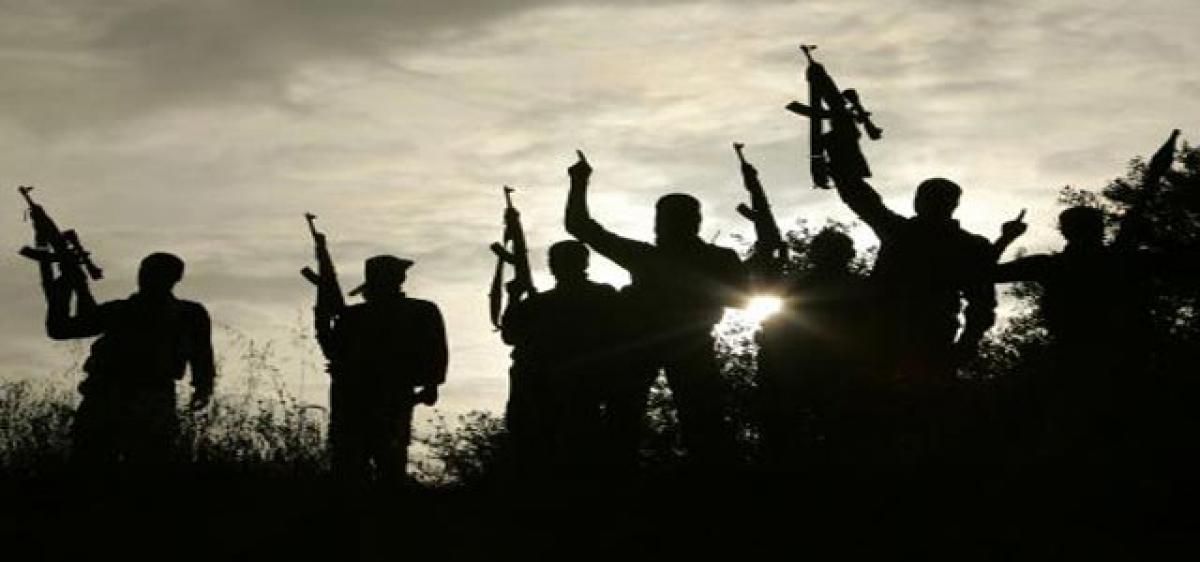Live
- Must-Watch OTT Originals in 2024: The Year’s Best Shows and Movies
- 40 Indian startups secure over $787 mn in a week
- India now formidable force on chess board
- Raghavendra Mutt pontiff visits Tirumala
- Whistleblower of OpenAI found dead in US apartment
- Trump’s US-first policy & India’s strategic latitude
- Chandrababu pays tribute to Potti Sriramulu and Sardar Vallabhbhai Patel
- India may miss TB elimination target
- Revolutionizing Women’s Health: The Era of AI
- Govt bill explains plan for ONOE
Just In

Amid renewed incidents of violence, the year 2016 proved that peace in Nagaland and Assam will remain a distant dream until the government changes a general perception among militant groups including those favouring talks that it is not serious at reviving the stalled dialogue process in the insurgency-hit northeastern states.
2016 in Retrospect
New Delhi : Amid renewed incidents of violence, the year 2016 proved that peace in Nagaland and Assam will remain a distant dream until the government changes a general perception among militant groups including those favouring talks that it is not serious at reviving the stalled dialogue process in the insurgency-hit northeastern states.
The government had earlier opened talks with the National Democratic Front of Bodoland (NDFB)-Progressive and Ranjan Daimary factions, National Socialist Council of Nagaland's Isak-Muivah (NSCN-IM) and United Liberation Front of Assam (pro-talks). But its failure to make any headway led others to question the government's seriousness to resolve the issue.
Several militant groups, including those from neighbouring Manipur, came together under one umbrella and formed the United Liberation Front of Western South East Asia (UNLFW). The groups in the conglomerate are strictly against peace talks.
As despair replaced hope, violence surged and several militant groups in Assam and Nagaland dormant over the years regrouped and revived their activities. This included the killing of 14 people in an August attack in Assam by NDFB (Songibijit) faction.
The militant conglomerate in May killed six Indian soldiers in Manipur's Chandel. This was followed by the killing of four Manipur Police personnel on December 15. The UNLFW has strong support from the NSCN-Khaplang -- a militant group that moved out of a 14-year-old ceasefire agreement with the government last year.
Though several attempts were made to persuade the group back into the truce talks, it made it clear that it did not have any faith in the Indian government's seriousness to solve the Naga issue.
"The government's attitude is so negative that it hurts the community and the cadres of the Naga groups. If we, after signing the accord, start confronting the security forces, we were told it is a violation of the accord. Then what about the apprehending of our cadres on false charges?" P Tikhak, a senior militant leader, told IANS.
In between, several other factions of the NSCN such as the Reformation and Unification groups though having a ceasefire with the government started distancing itself from the Naga Peace Accord and mocked at its slow progress.
Tikhak, from the NSCN-Reformation, warned they were ready to go back to the jungles to carry on their strikes if the government was unable to solve the six-decade-old Naga conflict.
The Naga peace talks suffered a jolt in June when the chairman of NSCN-IM died after a prolonged illness leaving a vaccum in the political space seeking to push for peace in the state.
Assam also suffered revival of violence by the United Liberation Front of Asom-Independent led by Paresh Baruah. The group said it would join the talks only if "sovereignty of Assam" stays the main subject. The ULFA-I was responsible for the kidnapping of 27-year old Kuldeep Moran nephew of a BJP legislator in Assam and demanded a ransom of Rs 1 crore. However, he was later released unharmed.
The group claimed responsibility for the killing of three soldiers in Tinsukia district on November 19. Similar incidents were witnessed in Arunachal Pradesh's Tirap district on the border with Assam.
As the year draws to a close, the NDFB-Progressive which is in peace talks with the government also started its mass agitation led by general secretary Gobinda Basumatary. Basumatary believes the government "fooled" them to join the peace process by making a "false promise of statehood" for Bodo tribes.
By Rupesh Dutta

© 2024 Hyderabad Media House Limited/The Hans India. All rights reserved. Powered by hocalwire.com







